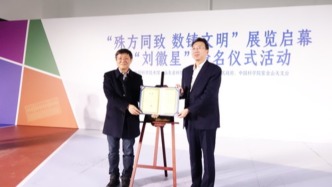Wu Jianguo, a famous virologist, former director of the State Key Laboratory of Virology, professor of the School of Life Sciences of Wuhan University, and director of the Institute of Pathogenic Microbiology of Jinan University, died at 1:07 a.m. on October 3 at 1:07 a.m. due to a sudden illness. Guangdong Foshan passed away at the age of 66.
On the afternoon of October 4, the WeChat public accounts of the State Key Laboratory of Virology of Wuhan University and the Foshan Institute of Pathogenic Microbiology successively issued obituaries.
Dr. Wu Jianguo is also a Distinguished Professor of the "Changjiang Scholar" of the Ministry of Education, an expert enjoying special government allowances from the State Council, the director of the Institute of Pathogenic Microbiology of Jinan University, the director of the Guangdong Provincial Key Laboratory of Virology, the executive director of the Foshan Institute of Pathogenic Microbiology, and the biomedicine of Jinan University. Head of the Industrial Park.

Famous virologist Wu Jianguo died in Foshan, Guangdong in the early morning of October 3
Wu Jianguo was born in Xingan County, Jiangxi Province in 1957. He graduated from the Department of Biology of Wuhan University with a bachelor's degree in microbiology in July 1982, and graduated from Wuhan University with a master's degree in virology in July 1985. From 1985 to 1986, he worked at Wuhan University. Lecturer in the Department of Virology, received a Ph.D. in molecular biology from the University of Idaho in 1992, and worked as a postdoctoral researcher in molecular biology at Princeton University from 1993 to 1996. In 2003, he was appointed as the director of the Key Laboratory of Virology of the Ministry of Education; in 2004, he was appointed as the director of the Department of Biotechnology, School of Life Sciences, Wuhan University; from 2004 to 2016, he was appointed as the director of the State Key Laboratory of Virology; in 2016, he was appointed as the pathogen of Jinan University Dean of the Institute of Microbiology; completed the retirement procedures at Wuhan University in June 2019; in 2020, served as the executive dean of the Foshan Institute of Pathogenic Microbiology. He once served as the chairman of Hubei Bioengineering Society, the director of Jinan University Biomedical Industrial Park, and the director of Guangdong Provincial Key Laboratory of Virology.
Jianguo Wu devoted his life to the fields of virology, infectious disease prevention and other biomedicine, especially in the research of virus infection and pathogenic mechanism, virus genetic variation and epidemiology.
The obituary said that even at the last moment of his life, Wu Jianguo remained at the forefront of the prevention and control of major infectious diseases.
According to the WeChat public account of Jinan University, on September 7, Wu Jianguo's team made new progress in the research on the mechanism of influenza virus regulation of interferon.
On September 7, the international academic journal PLoS Pathogens published online the latest research results of Wu Jianguo's team from Jinan University. The title of the paper is "Enzymatic independent role of Sphingosine kinase 2 in regulating the expression of type Ⅰinterferon during influenza A virus infection". This study revealed a novel mechanism by which influenza A virus (IAV) infection affects virus replication by regulating type I interferon synthesis through host sphingosine kinase SPHK2.
The study revealed the mechanism by which influenza virus uses the host factor sphingosine kinase SPHK2 to promote its own replication with a very delicate mechanism: After influenza virus infects a host cell, the SPHK2 protein increases in the cell and enters the nucleus, where SPHK2 interacts with HDAC1 , the SPHK2 substrate binding region interacts with TET3 bound to the IFN-β promoter to deacetylate the IFN-β promoter and inhibit the transcription of the IFN-β promoter, thereby inhibiting the synthesis of IFN-β, thereby promoting influenza Replication of the virus itself.
The discovery of this mechanism is a further improvement of the functional study of SPHK2, and provides new insights into the molecular mechanism of influenza virus evasion of host immunity, which further broadens our understanding of the interaction between influenza virus and the host.
Professor Wu Jianguo, Associate Professor Chen Jun, Professor Li Hongjian of Jinan University and Associate Professor Xia Chuan of Dalian Medical University are the co-corresponding authors of the paper.
In addition, on July 7, Wu Jianguo's team was invited by Nature's sub-journal "Signal Transduction and Targeted Therapy" and "Signal Transduction and Targeted Therapy" (impact factor 38.104) to write a long review article "Hypoxia signaling in human health and diseases: implications and prospects for therapeutics" was officially published in the journal.
The author summarizes the hypoxia signaling pathways related to important human diseases; expounds the correlation between new coronary pneumonia and hypoxia signaling, and proposes that the hypoxia signaling pathway is closely related to the occurrence of new coronary pneumonia; outlines the role of HIF-1α in the occurrence and development of tumors action and mechanism.
Wu Jianguo, a professor at the Institute of Pathogenic Microbiology, Jinan University, and Wan Pin, a researcher at the Foshan Institute of Pathogenic Microbiology, are the co-corresponding authors.
According to the Southern Metropolis Daily, on April 26, the Nature sub-journal "Signal Transduction and Targeted Therapy" published the latest important findings of the team of Professor Zhang Qiwei and Wu Jianguo on the Omicron variant of the new coronavirus. This study found for the first time that multiple cross-variant genes occurred between the Ormicron variant and Variants of Concern (VOC) / Variants of Interest (VOI) strains such as Alpha (Alpha), Beta (Beta), and Delta (Delta) An important mechanism of recombination, it is speculated that the recombinant "Deltacron-like Variant" produced by the Omicron and Delta strains has appeared in South Africa and Botswana as early as November 2021.




Comments